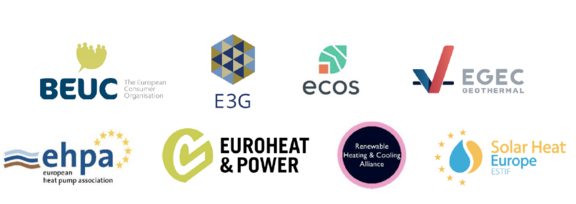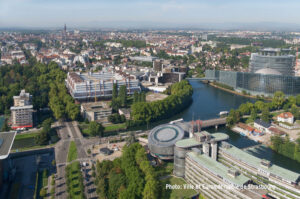Need for binding targets & national plans to support decarbonisation of H&C sector
- News
- 13 April 2021
A joint letter to Kadri Simson on heating & cooling decarbonisation.
Please click here to read the joint letter. On behalf of the signatories, we call on the Commission to put the heating and cooling sector on track to meet the goals in the Paris Agreement, by delivering an ambitious proposal that gives all stakeholders sufficient clarity for their investments.

Today, 80% of European consumers heat their homes with fossil fuels and the sector is responsible for one third of the EU’s greenhouse gas emissions. To meet our carbon neutrality goals, consumers will need to shift to sustainable heating systems, primarily smart heat pumps, sustainable district heating, solar thermal heat and geothermal technologies. As the average lifetime of a heating appliance is 15-20 years, the switch will need to happen rapidly as the purchasing decisions we make in the next decade will define the way we heat our homes in 2050.
However, mass consumer adoption of sustainable heating systems alone will not be sufficient to enable the transition in this sector, as its success will also depend on a deep transformation of the energy system. This transformation will require coordinated investments from a wide range of stakeholders, including consumers, electricity system operators, demand response companies, heat pump manufacturers, district heating operators, manufacturers of solar heating and cooling systems, companies operating in the geothermal sector and heating appliance installers.
An uncoordinated approach risks being more costly and locking us into fossil fuel infrastructure, hence we, the undersigned, call for including in the revised Renewable Energy Directive: (1) a binding target for renewable heating and cooling and (2) a requirement for Member States, in consultation with local authorities, to develop and implement national plans to decarbonise this sector to give consumers and companies the clarity and support they need to make the required investments.
National heating and cooling decarbonisation plans should include:
- Clear timelines and targets for the roll-out of sustainable heating systems, the deployment of district heating networks and the phase out of fossil fuels in heating.
A shift to smart electric heat pumps will only take place at the lowest cost for consumers if electricity system operators recognise that these appliances can be operated flexibly, and if consumers receive adequate incentives to do so. Clear information on the expected evolution of electric heat demand and of its flexibility is fundamental, as it will enable system operators to develop cost-efficient network development plans that prioritise demand side flexibility to grid reinforcements. This will reduce the need of investments in electricity grids and will lead to lower needs for consumers. Targets for the roll out of heat pumps, and the phase out of fossil fuels, should be set to provide this visibility to electricity system operators.
At the same time, an extension of renewable-based district heating networks will be essential to enable a cost-effective energy transition and millions of Europeans are expected to connect to these networks in the coming years. Member States, in consultation with local authorities, should make clear plans, with clear timelines, for district heating infrastructure development.
- Awareness-raising activities aimed to inform consumers of the change and what it means for them.
Consumers are often not aware that as a result of Europe’s and their countries’ decarbonisation efforts, fossil fuels will need to be phased out in the coming decades and they will need to switch to heating systems that they are not yet familiar with. Awareness raising activities explaining the benefits to consumers and the climate of sustainable heating systems will be key to nudge consumers to make the shift rather sooner than later.
- Incentives and financing mechanisms to support the switch to sustainable heating and cooling.
High upfront costs for sustainable heating systems are still a barrier preventing many consumers to shift to sustainable heating. National and local governments should introduce or strengthen financial support to the purchase of these systems and development of necessary infrastructure to enable millions of consumers to purchase or connect to sustainable heating systems. These financial incentives can cover among others low-interest loans, grants and tax rebates and should also specifically address energy poverty.
- Training programmes for installers of heating appliances.
Today consumers often struggle to find installers able to advise on and install sustainable heating technologies and buildings’ energy efficiency improvements. Training programmes for installers should be put in place to enable consumers to purchase clean heating systems. This should go along with measures increasing installers’ interest and willingness to undergo training and achieve relevant certifications.
Latest News
-

-
 26.10.2021 Celsius Summit 2021 – Energy Democracy
26.10.2021 Celsius Summit 2021 – Energy Democracy

